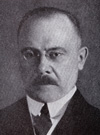The NBS Archives are open to the public at the following times:
Tuesday, Wednesday and Thursday
9 a.m. to 12 noon /
12:45 p.m. to 3 p.m.
In July, August and September the Archives are closed to the public.
Milan Hodža
 (*01 February 1878 in Sučany – †27 April 1944 in Clearwater, USA)
(*01 February 1878 in Sučany – †27 April 1944 in Clearwater, USA)
He was one of the founders and leaders of Slovak political agrarianism and, within this movement, he attached great importance to cooperatives as a tool for the economic emancipation of farmers. He contributed in a significant way to the establishment of the Central Cooperative for Economy and Trade as a nationwide headquarters of credit societies, which began operating on 18 February 1912 in Budapest. After the establishment of Czechoslovakia in February 1919 he initiated the creation of a new Central Cooperative in Žilina, which was later moved to Bratislava.
In March 1920, as minister for unification, he submitted a proposal for addressing lending conditions in Slovakia by merging the existing regional credit institutions, namely Hypoteční banka česká and Hypoteční banka moravská. The new Hypotečná banka československá established in this way was supposed to expand its activities to Slovakia by setting up government-backed branches. However, the proposal was rejected by representatives of Czech credit banks. Hodža made another attempt to improve the lending conditions in rural Slovakia in August 1921, when, together with other members of the Slovak parliamentary club, he asked the government for consent to establish an independent mortgage bank in Slovakia. The result was a compromise decision to authorise Czech banks to provide credit in Slovakia.
In May 1924, now minister of agriculture, he implemented his plans to establish a medium-level credit institution. The district credit institutions built on a cooperative basis under his proposal were called Roľnícke vzájomné pokladnice (Farmer Mutual Treasuries) and they supported each other through an organisation called Zväz roľníckych vzájomných pokladníc (Association of Farmer Mutual Treasuries).
In 1938, Hodža first emigrated to France and later to the United States, where he worked in expatriate societies.


